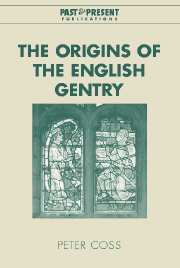Book contents
- Frontmatter
- Contents
- List of illustrations
- Preface
- 1 The formation of the English gentry
- 2 The roots of the English gentry
- 3 The Angevin legacy: knights as jurors and as agents of the state in the reign of Henry III
- 4 The crisis of the knightly class revisited
- 5 Knights in politics: minor landowners and the state in the reign of Henry III
- 6 Knighthood, justice and the early Edwardian polity
- 7 The explosion of commissions and its consequences
- 8 Identity and the gentry
- 9 Knights, esquires and the origins of social gradation in England
- 10 Crystallisation: the emergence of the gentry
- Appendices
- Bibliography
- Index
- Past and Present Publications
2 - The roots of the English gentry
Published online by Cambridge University Press: 10 December 2009
- Frontmatter
- Contents
- List of illustrations
- Preface
- 1 The formation of the English gentry
- 2 The roots of the English gentry
- 3 The Angevin legacy: knights as jurors and as agents of the state in the reign of Henry III
- 4 The crisis of the knightly class revisited
- 5 Knights in politics: minor landowners and the state in the reign of Henry III
- 6 Knighthood, justice and the early Edwardian polity
- 7 The explosion of commissions and its consequences
- 8 Identity and the gentry
- 9 Knights, esquires and the origins of social gradation in England
- 10 Crystallisation: the emergence of the gentry
- Appendices
- Bibliography
- Index
- Past and Present Publications
Summary
It is the argument of this book that the social formation known as the gentry grew out of thirteenth-century conditions and that it reached fruition in the early decades of the fourteenth. Nevertheless, and especially in so far as the gentry was a form of lesser nobility, it had deep roots which stretched back to late Anglo-Saxon England. The purpose of this chapter is to examine those roots and to show how they underpinned the later gentry. At the same time I will explain why I think it is inappropriate to talk of a gentry, as yet, in either late Anglo-Saxon or Angevin England.
Close attention has been given recently to the middle strata of late Anglo-Saxon society, to the thegns and to the variety of other men who acted as intermediaries between the state and the magnates on the one hand and the mass of peasantry and townsmen on the other. A number of scholars – among them Henry Loyn, James Campbell and Richard Abels – have been struck by the similarities between the lesser landowners of the pre-Conquest state and the gentry of later times. Others have been less circumspect. John Blair, in particular, has long been suggesting that the lesser landowners of late Anglo-Saxon England constituted a gentry. He has recently been joined in this by Rosamond Faith.
- Type
- Chapter
- Information
- The Origins of the English Gentry , pp. 20 - 43Publisher: Cambridge University PressPrint publication year: 2003

